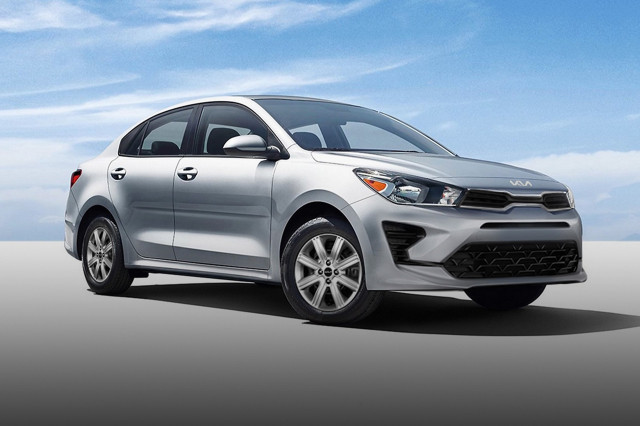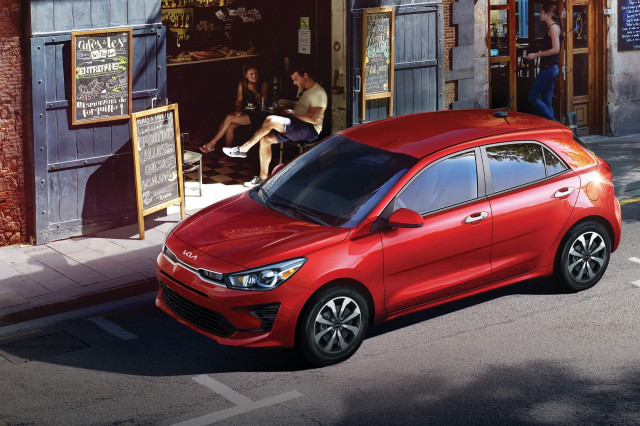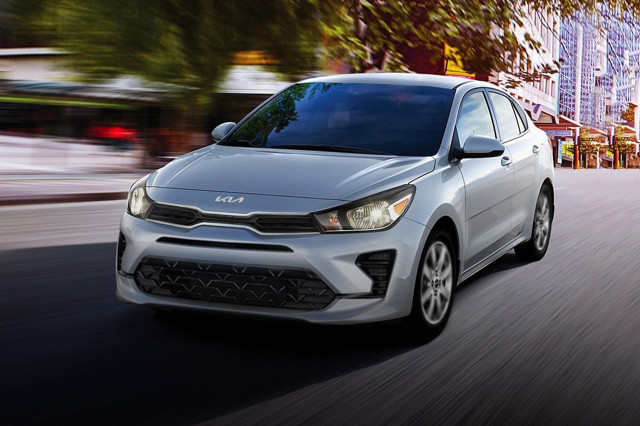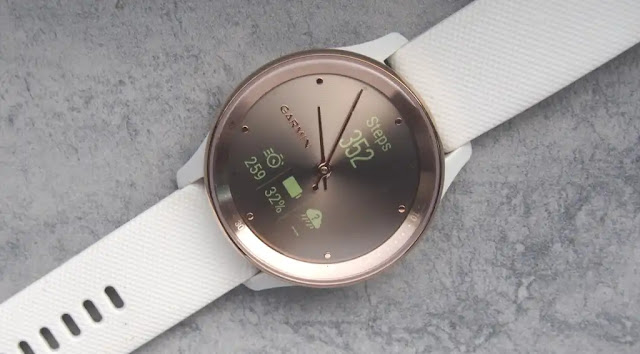LIKES
- A good value, when properly equipped
- Good fuel economy
- Decent ride quality for its size
- Great warranty
- Big infotainment
DISLIKES
- Shy on safety features
- Shy on options
- Shy on acceleration
BUYING TIP
The 2022 Kia Rio lacks some standard features, but fuel economy and value aren’t among them.
What kind of car is the 2022 Kia Rio? What does it compare to?
The Rio sedan and hatchback shore up the Kia lineup as its least expensive vehicles. They’re not crossovers, either, so there’s a sense of novelty about their continued presence in the showroom. The Nissan Versa and Hyundai Accent take up the same space in their respective brand families—for how long, is anyone’s guess.
Is the 2022 Kia Rio a good car?
It’s a fair value when outfitted with needed safety options. We give it a TCC Rating of 5.2 out of 10.
What’s new for the 2022 Kia Rio?
Nothing, since it gained a new front end and a bigger 8.0-touchscreen with wireless Apple CarPlay and Android Auto just last year.
Performance ranges from dull to dull, but that’s to the Rio’s favor. The uncomplicated 120-hp engine and CVT generate power that moves the Rio along without excitement but without fail. It rides well enough to render most commutes comfortable, too. It’s louder and less confident on the highway, but still delivers 36 mpg in mixed driving.
Four people can fit in the Rio, but two plus their work bags will fare better. The seats have enough padding to support even bigger drivers, and the sedan’s trunk can tote a couple of roll-aboards to the airport; hatchbacks have far more space with their rear seats folded down, turning them into urban mini-utility vehicles.
Only the Rio S comes with automatic emergency braking, and only when it’s optioned with a Technology package. Outward vision is good, but crash-test scores have faded as it’s aged.
How much does the 2022 Kia Rio cost?
We’d skip the $17,145 Rio LX sedan in favor of the $17,785 S sedan or $18,085 S hatchback, both of which have good infotainment, power features, and air conditioning. Every Rio has a 5-year/60,000-mile warranty. The Technology package adds automatic emergency braking, LED headlights, and keyless start. Start and stop there.
Where is the 2022 Kia Rio made?
In South Korea.
Styling
It’s contemporary, not clichéd.
Is the Kia Rio a good-looking car?
We think so. The economy-car cliches of past versions have been scrubbed, and the handsome shapes left behind have a functionally attractive look that’s worn well for a few years now. We give it a 5 for styling.
Both the sedan and hatchback have slim headlights and a tidy grille, but the stance of the hatchback give it the edge for us. It’s without any major miscues, as is the sedan; it’s just a tad more interesting.
Performance
It’s razzle-free but the Rio doesn’t dazzle, either.
Is the Kia Rio 4WD?
The Rio has front-wheel drive.
How fast is the Kia Rio?
The 4-cylinder isn’t bad, but with just 112 lb-ft of torque, it’s taxed when asked to pull anything more than one passenger. It has to be worked hard to respond. CVTs use bands and pulleys to change gear ratios, and though the Rio’s transmission slides through an infinite number of ratios with reasonable speed, there’s no surge of any kind, just more noise.
The Rio rides on 15-inch wheels and a basic strut and torsion-beam suspension. When we last drove one, the Rio’s usually gentle ride around town impressed us, as did its alert steering. It’s classic economy-car goodness, in terms of Rio performance, with carefully timed highway passes, rarer gas-station stops, and abrupt wake-up calls from potholes encountered in morning commutes. It handles it all well, even with rear drum brakes that can pull down its 2,762-lb body without drama.
Comfort & Quality
Kia carves a fair amount of room from the Rio.
Two people and their backpacks fit well in either Rio, but four will need to know each other well, and travel light. For comfort and utility the Rio earns a score of 5.
Both versions ride on a 101.6-inch wheelbase; the five-door is 160.0 inches long, the sedan 172.6 inches. Neither is much bigger than a Mini Cooper.
Front-seat passengers have manually adjusted buckets with a limited range of movement, but the seats have decent padding and shape. Kia molds in storage for a smartphone and cable plus some spare change in the console.
Rio sedans have 13.7 cubic feet of cargo space, while the hatchback nudges that up to 17.4 cubic feet—or 32.8 cubic feet with the rear seats folded out of the way.
It’s not too quiet under full acceleration, but the Rio seems well-assembled, with a solid grade of interior plastic trim and durable upholstery.
Safety
Advanced safety features cost extra on the Rio.
How safe is the Kia Rio?
It hasn’t been crash-tested in a while by the NHTSA, but the IIHS thinks its performance is mostly “Good.” However, front-passenger impact protection gets scored as “Acceptable.”
In either body style the Rio has good outward vision, which gains a point above average here—but it loses that point for walling off automatic emergency braking in an option package that includes automatic high beams and active lane control. It’s not that expensive, but it’s only offered on the Rio S trim. Add all that up, and the Rio rates a 5 for safety.
Features
With all the options, the Rio still offers good value.
The Rio has most of the economy-car basics, except for standard automatic emergency braking. It’s light on options but heavy on warranty coverage, so we give it a 5 here.
Which Kia Rio should I buy?
Pass on the $17,145 Rio LX four-door, which comes with an8.0-inch touchscreen with wireless Android Auto and Apple CarPlay, air conditioning, and power features, but not with automatic emergency braking. Pick either the $18,085 S hatchback or $17,785 S sedan, which get a fold-down rear seat and an armrest, along with keyless entry.
From there you’ll want to spend about $1,000 on the Technology package to get automatic emergency braking, along with 15-inch wheels, LED headlights, and keyless start.
The Rio comes with a 5-year/60,000-mile warranty.
Fuel Economy
The Kia Rio is a miser.
Is the Kia Rio good on gas?
It is. The EPA pegs it at 33 mpg city, 41 highway, 36 combined, which earns a 7 on our scale and makes it one of the most efficient new cars that’s not a hybrid or an electric car.























0 comments:
Post a Comment